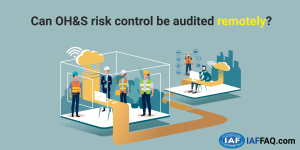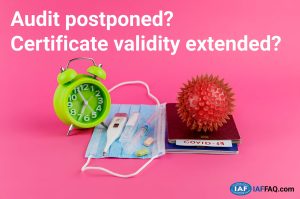IAF Frequently Asked Questions
COVID-19 Pandemic
The FAQs are some of the questions that we are frequently asked in some (but not all) of the areas in which IAF Accreditation Body (AB) members and their accredited Certification Bodies (CBs) practice. The questions and answers are not intended to be exhaustive; however, they constitute a common understanding and a guidance to manage, in a harmonized way, the conformity assessment activities under the specific situation of COVID-19.
The FAQs are endorsed by an IAF General Assembly Resolution (2020-16), which can be viewed here.
You can find translations here:
IAAC translation to Spanish here: https://bit.ly/36rwoUt
KAB translation to Korean here: https://bit.ly/30cyDcy
ACCREDIA translation to Italian here: https://bit.ly/3iRuyRC
Please also check the resources made available by ISO/ CASCO STAR in the following page www.iso.org/ca-covid19.html that should prove useful to anybody who works in conformity assessment and is facing challenges related to COVID-19.

Latest FAQs
- Q34: Can Accreditation Bodies carry out consecutive assessments during the COVID lockdown period using remote techniques? ISO/IEC 17011 states in 7.9.3 “The time between consecutive on-site assessments shall not exceed 2 years. However, if the accreditation body determines that an on-site assessment is not applicable, it shall use another assessment technique to achieve the same objective as the on-site assessment being replaced and justify the use of such techniques (e.g. remote assessment).” Therefore is it correct that the AB can justify using alternative techniques in this situation?A34: Yes, considering the current restrictions on travel it would be a suitable justification, subject to risk assessment, to use remote techniques in consecutive assessments within a 2 year period.
- Q33: If the recertification audit is conducted remotely after the 12-month extension allowed per FAQ 31, then to demonstrate an effective QMS, are the 2 subsequent surveillance audits to be conducted in a shorter time, therefore doing more than one audit per year, or is it possible to complete the certification cycle effectively skipping an audit?A33: it depends on the situation and the associated risks.
- Q32: According to ISO/IEC 17021-1:2015, § 9.1.3.3, “Surveillance audits shall be conducted at least once a calendar year, except in recertification years. The date of the first surveillance audit following initial certification shall not be more than 12 months from the certification decision date”. Is this clause still valid?A32: Yes. However, given the specific circumstances, all the time limits indicated in the standard have to be reconsidered according to the IAF FAQ Q10 that allows the postponements of any conformity assessment activities. This means that: it is not necessary to conduct a surveillance audit at least once a calendar year; the date of the first surveillance audit following…
Updated FAQs
Q6: Is the limit imposed by ISO/IEC 27006 (maximum 30% of remote audit) still valid?
Q25: During the COVID-19 crisis, if a CAB conducts a part of the recertification of a management system with remote audit activities and plans to complete the remainder of the audit onsite within six months, is it possible to reissue the certificate at the conclusion of the remote audit activities?
Q14: For OH&SMS, according to IAF MD5:2019 (applicable from 7 May 2020), remote auditing techniques shall be limited to reviewing documents/records and to interviewing staff and workers. In addition for OH&SMS, process control and OH&S risk control cannot be audited using remote audit techniques. Considering the specific circumstances, is this valid?
Q15: What will happen to the Migration period for ISO 45001; will it be extended?
Q10: For schemes under IAF MLA (Management system certification, Product certification, Certification of persons, Validation and Verification), how are conformity assessment activities to be managed in this extraordinary period?
Click here for complete list of FAQs

Most viewed FAQs:

Q23: In consideration of this extraordinary period, if a Management Systems Certification Body is not able to perform audits, physically or with remote audit technique, can an Accreditation Body replace a witness assessment, as required in IAF MD17, with a remote office assessment or with other assessment activities (IAF MD17, § 2.2.1)?

Q20: What will happen to the Transition periods (e.g. ISO 22000:2018, ISO 50001:2018); will these be extended?

Q19: According ISO/IEC 17021-1, § 7.2.4, “The initial competence evaluation of an auditor shall include the ability to apply required knowledge and skills during audits, as determined by a competent evaluator observing the auditor conducting an audit”. Is it possible to conduct this observation if the observer is using remote audit techniques?

Q17: During the COVID-19 crisis, if a CAB conducts a part of the initial certification of a management system with remote audit activities and plans to complete the remainder of the audit onsite within six months, is it possible to issue the certificate at the conclusion of the remote audit activities?

Q14: For OH&SMS, according to IAF MD5:2019 (applicable from 7 May 2020), remote auditing techniques shall be limited to reviewing documents/records and to interviewing staff and workers. In addition for OH&SMS, process control and OH&S risk control cannot be audited using remote audit techniques. Considering the specific circumstances, is this valid?

Q13: In consideration of this extraordinary period, may all of:
- the conformity assessment activities (e.g. surveillances, recertification) be postponed for up to 6 months, and
- the validity of any output of any conformity assessment activity (e.g. a certificate or report) be extended for a corresponding period of up to 6 months?
